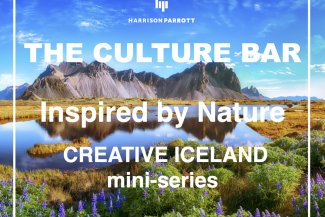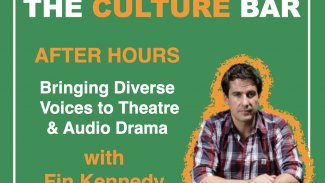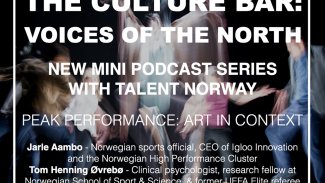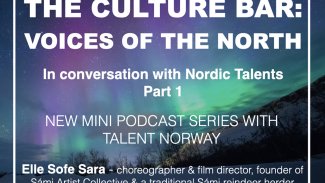The Culture Bar Podcast: Creative Iceland — Inspired by Nature
13/9/2021

Creative Iceland mini-series
Welcome to Creative Iceland – a special The Culture Bar mini-podcast series focusing on the creative scene in Iceland. This series is hosted by Icelander Arna Margrét Jónsdóttir from HarrisonParrott. Arna will be speaking with fellow Icelanders about various topics related to the creative scene in Iceland.
In this first episode, we are joined by Dr. Arnar Eggert Thoroddsen an Icelandic music journalist and scholar, and we discuss the popular assertion that the unique natural environment is the source of creative inspiration for artists and creatives in Iceland.
Iceland has long been associated with a high level of creativity and many believe the country’s striking natural environment is a major contributing factor when it comes to creative inspiration. During this interview, we focus on the music scene and explore why this connection between nature and creativity has become so dominant in the discourse around the creative scene in Iceland and how it affects the artists and the scene as a whole.
Thoroddsen is the director of the undergraduate media and communication studies programme at The University of Iceland. He earned his Master’s Degree from the University of Edinburgh in 2013 and a PhD in 2019 from the same university, where he carried out a research on the social dynamics of Icelandic musicians under the supervision of Professor Simon Frith. He is the author of three books on Icelandic music with the fourth in the writing stage. He’s been writing about music and popular culture since 1999, mainly for Morgunblaðið daily but his writings have also appeared in article collections and music sites abroad.
Biography:
Dr. Arnar Eggert Thoroddsen (b. 1974) is an Icelandic music journalist and scholar. He’s been writing about music and popular culture since 1999, mainly for Morgunblaðið daily but his writings have also appeared in article collections and music sites abroad. He is the author of three books on Icelandic music with the fourth in the writing stage (will be published by the U.K. publisher Reaktion Books/The University of Chicago Press). He has been a member of numerous jury panels and boards, both at home and abroad, and is also a regular commentator on music in television, radio and other media in his native Iceland. Arnar has written extensively on Scandinavian music, especially about music from the Faroe Islands, and has been a member of the Nordic Music Prize jury since 2010. He has also presented his own radio shows and webisodes, DJ’ed, organized concert series and runs his own Reykjavik Music Walk company along with his wife. He also has his own website, arnareggert.is. Arnar earned his Master’s Degree from the University of Edinburgh in 2013 and a PhD in 2019 from the same university, where he carried out a research on the social dynamics of Icelandic musicians under the supervision of Professor Simon Frith. He is now the director of the undergraduate media and communication studies programme at The University of Iceland (The Faculty of Social and Human Sciences), earning his B.A degree in sociology at the same university in 1999, with a thesis on The Simpsons.


